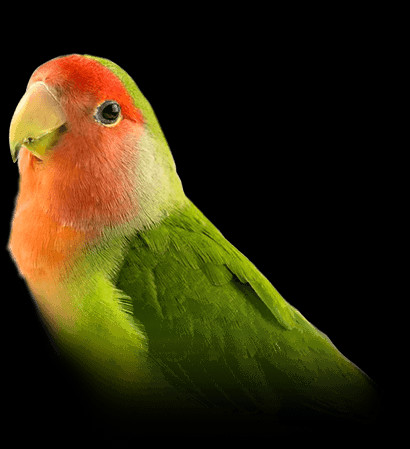Lovebirds are charming and affectionate companions, but their well-being depends heavily on a proper diet. Many new lovebird owners wonder, “What can I feed my lovebird?” The answer is more than just seeds! This guide will delve into the essential components of a healthy lovebird diet, ensuring your feathered friend thrives.
 alt text: A green lovebird perched on a branch
alt text: A green lovebird perched on a branch
Understanding Your Lovebird’s Nutritional Needs
In the wild, lovebirds forage for a diverse range of grasses, plants, and seeds. This variety provides a balanced intake of carbohydrates, proteins, fats, vitamins, and minerals. A common mistake is assuming a seed-only diet is sufficient. While seeds are part of a lovebird’s natural diet, relying solely on them can lead to nutritional deficiencies and health problems like obesity and iodine deficiency. Just like us, lovebirds need a well-rounded diet to flourish.
Building a Balanced Diet for Your Lovebird
A healthy lovebird diet consists of several key components:
Seeds: Moderation is Key
Seeds are convenient and readily available, but they should only make up a small portion of your lovebird’s daily intake. Commercial seed mixes often lack variety, leading birds to pick out their favorites and leave the rest. This selective eating can result in an unbalanced diet. Offer 1.5 to 2 level teaspoons of a good quality seed mix per bird per day. If you have multiple birds, use separate dishes to ensure everyone gets their share.
Pelleted Diets: The Ideal Choice
Pelleted diets are specifically formulated to meet all of a lovebird’s nutritional requirements. They come in various forms (pellets, crumbles, mashes) and are designed for different life stages. While converting a seed-loving bird to pellets can be challenging, it’s crucial for their long-term health. Gradually introduce pellets alongside seeds, slowly decreasing the seed portion over several weeks. Patience and persistence are key!
:max_bytes(150000):strip_icc()/GettyImages-182627300-5c49589446e0fb0001a19352.jpg)
Fruits and Vegetables: Essential Nutrients
Fresh fruits and vegetables should comprise approximately 20-25% of your lovebird’s diet. Offer a wide variety of colorful options, avoiding pale, watery vegetables like iceberg lettuce. Wash everything thoroughly and cut into manageable pieces. Just like with children, introducing new foods may take time and persistence.
Water: The Foundation of Life
Fresh, clean water is vital. Change the water daily and thoroughly clean the water dish, especially if using tube or gravity waterers.
Occasional Treats: “People” Food in Moderation
Some “people” foods can be offered occasionally as treats. Small amounts of lean meat, cheese, or egg can be enjoyed, but avoid junk food and alcoholic beverages. Dairy products should be given sparingly.
Special Considerations
Young, stressed, injured, breeding, or molting birds may have specific dietary needs. Consult your veterinarian for guidance in these situations.
Vitamin and Mineral Supplements
If your lovebird is eating a primarily pelleted diet, they likely don’t need supplements. However, your veterinarian can help assess your bird’s individual needs and recommend appropriate supplementation if necessary.
Grit: A Controversial Topic
Grit aids in digestion, but its necessity for captive birds, especially those on pelleted diets, is debated. Offering a small amount in a separate dish allows your bird to choose if they need it. Avoid grit with charcoal, as it can absorb essential vitamins.
Monitoring Your Lovebird’s Health
Observe your lovebird’s eating habits and droppings daily. Changes in appetite, droppings, or behavior can indicate a health problem and warrant a veterinary visit.
Conclusion
Providing a balanced and varied diet is crucial for your lovebird’s health and happiness. By understanding their nutritional needs and offering a mix of high-quality pellets, seeds, fresh produce, and clean water, you can ensure your feathered friend lives a long, vibrant life. Remember to consult with your veterinarian for personalized dietary recommendations. A well-fed lovebird is a happy lovebird!
